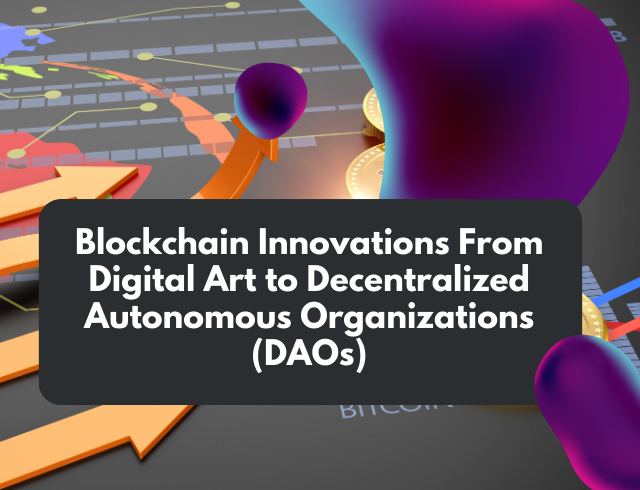![]()

Introduction
In the ever-evolving landscape of technology, blockchain has emerged as a transformative force, disrupting industries and redefining the way we perceive and interact with digital assets. Beyond its initial application in cryptocurrencies, blockchain technology has paved the way for groundbreaking innovations, ranging from the creation of digital art to the rise of Decentralized Autonomous Organizations (DAOs). This blog explores the diverse spectrum of blockchain innovations, highlighting the journey from the realm of digital art to the frontier of decentralized governance.
Digital Art on the Blockchain
The intersection of blockchain and art has given rise to a revolution in the way we value and trade digital creations. Non-fungible tokens (NFTs), built on blockchain technology, have become the cornerstone of this revolution. NFTs provide a unique and verifiable way to represent ownership of digital assets, allowing artists to tokenize their work and sell it directly to collectors. This has not only empowered artists by providing a new revenue stream but has also created a paradigm shift in the art market, where authenticity and provenance are guaranteed through the immutable nature of blockchain.
Decentralized Finance (DeFi)
Blockchain’s impact extends far beyond the art world. Decentralized Finance, or DeFi, represents a paradigm shift in the traditional financial sector by leveraging blockchain to offer financial services without the need for traditional intermediaries. DeFi platforms utilize smart contracts to automate and decentralize processes like lending, borrowing, and trading, providing users with more control over their financial assets. The transparent and auditable nature of blockchain ensures trust, while decentralized protocols create a more inclusive and accessible financial ecosystem.
Decentralized Autonomous Organizations (DAOs)
DAOs represent a new frontier in organizational structure, driven by blockchain’s ability to enable decentralized decision-making. These entities operate through smart contracts and allow participants to have a direct say in the governance of a community or organization. Members of a DAO can propose and vote on decisions, creating a transparent and democratic framework. DAOs have the potential to disrupt traditional corporate structures, fostering collaboration and innovation in a way that was previously unthinkable. However, challenges such as security vulnerabilities and the need for effective governance models must be navigated to unlock their full potential.
Blockchain in Supply Chain
Blockchain’s traceability and transparency features have found applications in supply chain management, revolutionizing the way goods are tracked and verified. By recording every transaction on an immutable ledger, blockchain ensures the authenticity of products and helps combat issues like counterfeiting. This innovation not only benefits consumers by providing them with accurate information about the origin of products but also enhances efficiency and reduces fraud within the supply chain.
Environmental and Social Impact
The growing popularity of blockchain technologies, especially in the context of cryptocurrency mining, has raised concerns about their environmental impact. Many blockchain projects are actively working to address these concerns by exploring more sustainable consensus mechanisms. Additionally, blockchain is being used to improve transparency in supply chains, supporting fair trade and ethical business practices. The technology has the potential to positively impact environmental and social issues when implemented with a conscious effort towards sustainability.
Conclusion
Blockchain innovations have transcended their origins in the world of cryptocurrencies to permeate various aspects of our digital and physical lives. From empowering artists through NFTs to reshaping financial services with DeFi and redefining organizational structures with DAOs, the impact of blockchain technology is profound and multifaceted. As we navigate this rapidly evolving landscape, it is essential to consider the ethical implications and sustainability of these innovations, ensuring that blockchain continues to be a force for positive change in the years to come.
Frequently Asked Questions :
1. What are Non-Fungible Tokens (NFTs) and how do they work?
Non-fungible tokens (NFTs) are unique digital assets on a blockchain, representing ownership of specific items like digital art. They operate on a decentralized ledger, ensuring transparency and authenticity through a unique transaction history.
2. How does Decentralized Finance (DeFi) differ from traditional finance?
DeFi is a blockchain-based financial ecosystem that eliminates traditional intermediaries. It uses smart contracts for processes like lending and trading, offering transparency and accessibility. Unlike traditional finance, DeFi operates without centralized control.
3. What is a Decentralized Autonomous Organization (DAO) and how does it function?
A DAO is an organization governed by smart contracts on a blockchain. Members participate in decision-making through voting on proposals. DAOs offer transparency and decentralization, but challenges include security issues and governance model effectiveness.
4. How does blockchain enhance traceability in the supply chain?
Blockchain improves supply chain traceability by creating an immutable ledger of transactions. Every step, from production to distribution, is recorded, ensuring transparency. This traceability helps verify product authenticity, reduces fraud, and ensures compliance with ethical standards.
5. What environmental considerations are associated with blockchain technology?
Blockchain’s environmental impact is linked to cryptocurrency mining energy consumption. While some networks use substantial power (e.g., Bitcoin’s proof-of-work), efforts are underway to adopt more sustainable consensus mechanisms, like proof-of-stake. Blockchain also contributes positively by promoting transparency in supply chains and supporting sustainability.
